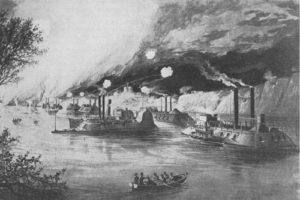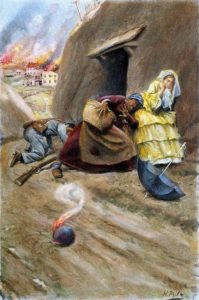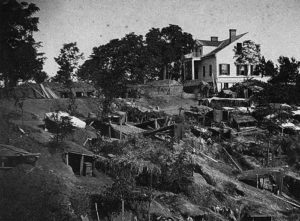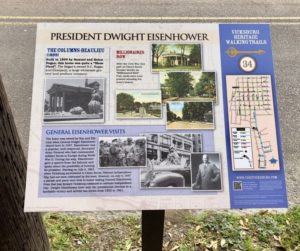For most people living in America, July 4th brings to mind that day back in 1776 when the 13 colonies officially declared themselves independent of Great Britain, thus creating the United States of America as a distinct, sovereign nation. But for about 75 years, citizens of Vicksburg didn’t have the heart to celebrate Independence Day, or regard the day as anything to celebrate at all. Curious as to why?
The year 1863 was a pivotal one during the Civil War. The war had been going on for two years, far longer than many believed it would last. Union General U.S. Grant set his sights on Vicksburg in the spring. If he gained control of this port town, he could cut off the Confederacy’s access to the Mississippi River. To Confederate President Jefferson Davis, Vicksburg was the “nail head that holds the South’s two halves together.” President Abraham Lincoln remarked, “Vicksburg is the key! The war can never be brought to a close until that key is in our pocket.”
In April 1863, Union ships sailed down the Mississippi River past the Confederate artillery defending Vicksburg. They arrived south of the city and began ferrying Grant’s army across the river. Next, they marched east toward Jackson, Mississippi. Confederate forces led by General John C. Pemberton tried to stop Grant’s advance at the Battle of Port Gibson and the Battle of Raymond in early May 1863. The Confederates failed to stop Grant’s advance. Jackson, an important railroad junction, fell to Union forces on May 14. This loss kept the Confederacy from easily sending reinforcements and supplies to the troops guarding Vicksburg.

Reproduction of a contemporary sketch showing Porter’s fleet running the Confederate batteries at Vicksburg, April 16, 1863
With the fall of Jackson, Grant marched west toward Vicksburg. Pemberton continued to try to stop the Union advance at the Battle of Champion Hill on May 16 and the Battle of Black River Bridge on May 17. The Confederate troops failed in their efforts. The Union forces had nearly forty thousand men and greatly outnumbered the Confederates. In the first few weeks of May 1863, Pemberton lost nearly one-half of his forty thousand men to Grant’s army.
Grant launched his siege on Vicksburg in May and for two months the city remained under siege. During the siege, the city was bombed every day. By the end, the starving population of the city had been reduced to eating mules, dogs, cats and even rats. The horrors of the siege are documented in the diaries kept by citizens. Mary Loughborough whose diary was later published as “My Cave Life in Vicksburg” wrote:
“A little negro child, playing in the yard, had found a shell; in rolling and turning it, had innocently pounded the fuse; the terrible explosion followed, showing, as the white cloud of smoke floated away, the mangled remains of a life that to the mother’s heart had possessed all of beauty and joy.”

Howard Pyle painting of terrorized people spotting a rocket shell.
On July 4, one day after the Confederacy’s well-known defeat at Gettysburg, Vicksburg finally fell to the Union.

The Shirley House and the encampment of the Fifth Illinois during the siege of Vicksburg. Reproduction of a wartime photograph
Though the war dragged on for another two years, the Confederacy never recovered. They would never again have any sort of real momentum despite winning some larger battles. Perhaps this explains why citizens of Vicksburg for many years weren’t in a celebratory mood on July 4. Civil War historians rank the Battle of Vicksburg as one of the most strategically significant in the entire war, and certainly the most important battle fought in the Magnolia State.

President Dwight Eisenhower Marker. Erected 2017 by the City of Vicksburg.
It was not until after World War II in 1945 that Vicksburg joined the rest of the nation in the celebration of Independence Day. The patriotic fervor after the war and a visit by General Dwight D. Eisenhower helped spawn a return to celebrating the birth of our nation. According to the Philadelphia Record: “Vicksburg cast aside its prejudices dating back to the Civil War and staged about the biggest show this historic old city ever saw.” The article mentioned Northern and Southern soldiers marching side by side. The mayor told citizens “From today on there are no more die-hards in the South. We’re all one with the Union.” There was dancing in the streets with Southern girls being twirled by Yankee boys. Vicksburg realized that their sons were fighting and dying with soldiers from the North on European grounds, and even being called “yanks”. So, they overcame the bias and celebrated the 4th of July.





